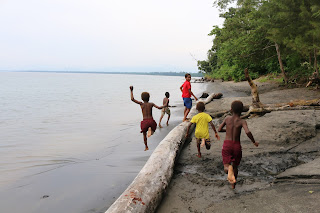A PAPUA NEW GUINEA COMMUNITY FACING CLIMATE CHANGE
Picture captions
TOP - Batalomew Waka pointing to a coconut stump submerged by the sea.
MIDDLE - Part of a road eroded by the rising sea level.
BOTTOM - Children in Pokili area running along the beach.
Part VI
Batalomew’s
experiences on climate challenges
Batalomew
Waka, 65 years of age, is a strong advocate for environment conservation and climate
change mitigation efforts.
As a
village elder and awareness chairman of the Pokili Wildlife Management (WMA) in
the Vavua LLG of West New Britain Province, Waka movingly tells how climate
change is affecting the communities of Makasili, also in the Vavua LLG.
Here, the local
landowners who once lived in harmony with their seas and had beautiful
shorelines in their home fronts, are now being forced inland by the rising sea
level. For Waka and his community, this is a growing concern as a result of climate
change.
“During my
early days, we had never seen any changes like what you are seeing here today’,
Waka expressed as he pointed to the shorelines where stumps of coconuts remained
submerged in the sea.
“The sea
level rise is claiming our land along the coastline from Makasili to Pokili including
our freshwater catchment areas as we watch helplessly. We feel disturbed by the
rising sea level. This is a daily experience we constantly endure with in our lives.
It is painful but is real”, Waka expressed.
Similar
sentiments have been expressed by clan members of villages situated along the
Makasili area where huge parts of their land are increasing claimed by the sea.
Besides the
rising sea level, communities in between Makasili and Pokili are also being
confronted by other development challenges. One of which is the intrusion of
unsustainable logging operations for palm oil developments. These operations remain
a threat to their pristine forests and the habitats living there in.
“As the sea
is claiming our land, large tracts of forests are being cleared for palm oil
development which also remains a serious concern for us all. Currently our
waters are no longer clean because of huge soil erosion through forest
clearance for palm oil developments. Our people have to go very far to fetch
clean drinking water”.
“During the
rainy seasons, there are soil erosions from where timbers are harvested which
also pollute nearby rivers downstream”.
Waka’s
account of plight endured through the impacts of climate change and
unsustainable logging remains a need for concerted effort and dialogue among especially
the Pokili Community which has a large tract of secondary forest together with
the local LLGs, Provincial Administration and other relevant authorities.
Amidst the
development challenges, the Pokili community remains adamant that their last
tracts of forests are kept intact and are managed in a sustainable manner for long-term
social, economic and environmental benefits. They have taken a bold stand by
committing a huge portion of 10, 535 hectares as conservation area which has
been recognized and registered as the Pokili WMA.
During a
Climate Change and forestry (REDD+) Media Training field trip recently,
organized by the Climate Change and Development Authority (CCDA) with the
support of UNDP/Forest Carbon Partnership Facility (FCPF), Waka and a few elders
in his village were captivated when introduced to the concepts of Reducing
Emissions from Deforestation and forest Degradation known as REDD+. REDD+ is a
climate change mitigation approach through the reduction of forest loss which
PNG is undertaking through implementation of improved policies and measures led
by CCDA.
“I’ve
learnt a little about REDD+ through a few workshops in in Kimbe and Port
Moresby and I’ve found it very interesting.
“The
principles of REDD+ were community beneficial and if that works well with us (communities)
in promoting and sustainably managing our forests and environment, we are
willing to support because our forests, seas and the environment are the
essence of our lives’, Waka said.
Waka
said, as the village elder and awareness chairman of the Pokili community, it
is their wish to see that human induced activities resulting in their natural environment
which includes, the land, the sea and the forest are stopped.
“Life feels
incomplete without any of these three’, said waka emphatically. I see all these
children (as he pointed to the children running along the beach) and I am
always concerned about what the future holds for them in relation to these
challenges”, said Waka concerningly.
In bringing
these concerns to light, Waka expressed the need to have their plight
communicated at different levels to identify better options in mitigating the risks
posed by climate change and the development challenges faced by their
community.





No comments:
Post a Comment